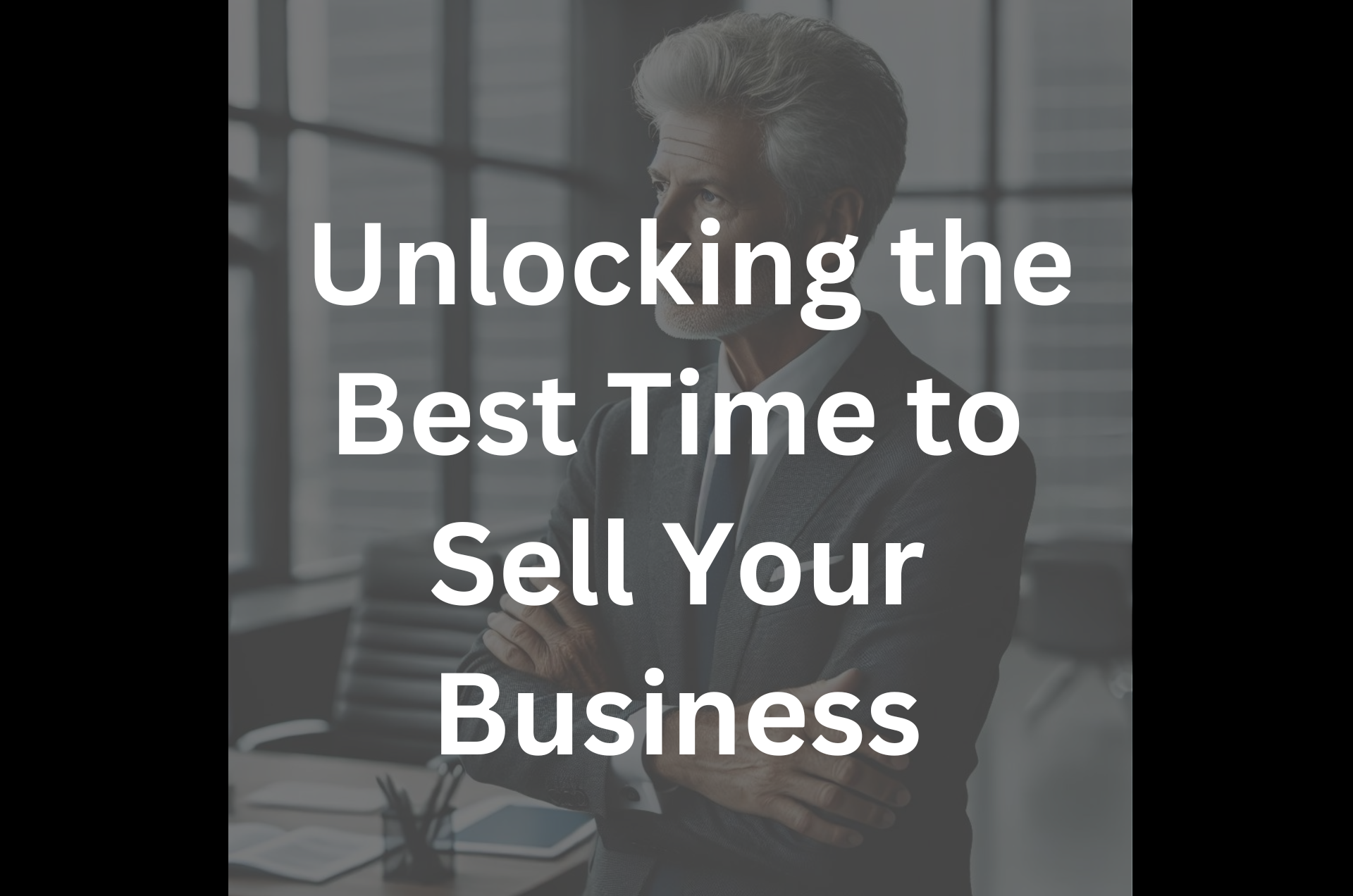**Disclosure:** We believe in honesty and transparency to the fullest extent. Some of the links on this blog are affiliate links, meaning, at no additional cost to you, we will earn a commission if you click through and make a purchase. This is one of the simplest ways you can support us.
Deciding to sell your business is a significant and multifaceted decision that goes beyond financial considerations. It involves assessing market conditions, evaluating the health and performance of your business, and reflecting on your personal goals and readiness. This article will explore the key factors that can influence the timing of your business sale, providing you with actionable insights to ensure you maximize value and achieve a smooth transition. Whether you’re planning to sell now or in the future, understanding these elements will help you make an informed and confident decision.
Market Conditions

Understanding how market conditions impact the sale of a business is crucial for making a well-timed decision. Here’s what to consider:
- Economic Climate: The broader economic environment plays a significant role in business valuations. During economic booms, businesses generally fetch higher prices due to increased consumer confidence and spending. Conversely, during recessions, buyers may be scarce, and valuations may drop.
- Example: A restaurant owner sold their business during an economic upswing and secured a higher sale price due to robust consumer spending and optimism in the market.
- Industry Trends: Timing your sale to coincide with industry growth can significantly increase your business’s attractiveness to buyers. Selling during an industry upswing ensures higher demand and better valuation.
- Example: A tech startup sold at the peak of a tech boom, capitalizing on the high demand for innovative technology solutions.
- Interest Rates: Low interest rates can make financing more accessible for buyers, expanding the pool of potential buyers and potentially driving up the sale price. Conversely, high interest rates can restrict buyer access to capital.
- Example: A manufacturing business sold when interest rates were low, attracting more buyers who could secure favorable financing terms.
Actionable Tip: Keep an eye on economic indicators and industry reports to identify favorable conditions for selling your business.
Business Health and Performance
Internal factors related to your business’s operations are critical in determining the right time to sell. Here’s what to focus on:
- Financial Health: Strong profit margins, stable cash flow, and positive revenue growth trends make your business more attractive to potential buyers. Prospective buyers will scrutinize your financial statements, so ensure they reflect a healthy, growing business.
- Example: A retailer with consistent year-over-year revenue growth and strong profit margins sold at a premium because buyers saw a well-managed, profitable business.
- Operational Maturity: A business with well-established systems, processes, and infrastructure that can run smoothly without the owner’s constant involvement is more appealing. Buyers want to invest in a business that promises continuity and minimal disruption.
- Example: A service company with automated systems and a capable management team sold quickly because the new owner could step in with ease.
- Customer Base: A diverse and loyal customer base is a strong selling point. It indicates stability and reduces the risk for buyers. A business reliant on a few key customers may be viewed as riskier.
- Example: A subscription-based business with a broad, loyal customer base was highly attractive to buyers due to predictable and recurring revenue.
Actionable Tip: Regularly review and enhance your financial health and operational maturity to boost your business’s marketability.
Personal Readiness
Selling your business is not just a financial decision; it’s also deeply personal. Here are key factors to consider:
- Personal Goals: Ensure that selling your business aligns with your long-term personal, financial, and lifestyle goals. Whether you’re looking to retire, start a new venture, or achieve financial freedom, your personal aspirations should guide your decision.
- Example: An entrepreneur sold their business to fund a passion project, allowing them to pursue a long-held dream without financial stress.
- Retirement Planning: If retirement is on the horizon, consider how selling your business fits into your retirement plans. Timing the sale to coincide with your desired retirement age can help ensure a smooth transition.
- Example: A business owner sold their company at 60, using the proceeds to comfortably retire and travel the world.
- Burnout: Prolonged stress and fatigue can be signs that it’s time to move on. If running the business is no longer fulfilling or is taking a toll on your health, selling might be the best option for your well-being.
- Example: After years of long hours and constant pressure, an owner sold their business to focus on their health and spend more time with family.
Actionable Tip: Reflect on your personal readiness and ensure that the decision to sell aligns with your broader life goals and current circumstances.
Legal and Financial Planning
Preparing your business for sale requires thorough legal and financial planning. Here’s what you need to consider:
- Clean Financials: Having organized and transparent financial statements is crucial. Buyers will conduct due diligence, and clean financials can speed up the process and build trust. Ensure all financial records are up-to-date and accurately reflect the business’s performance.
- Example: A business with well-documented financials and clear profit margins attracted multiple buyers quickly due to the ease of due diligence.
- Tax Implications: Understand the tax consequences of selling your business. Different timing and sale structures can significantly impact your tax liabilities. Consulting with a tax advisor can help you navigate these complexities and optimize your after-tax proceeds.
- Example: A business owner who sold their company at the beginning of a tax year minimized their tax burden through strategic planning.
- Succession Planning: A well-thought-out succession plan can make your business more attractive to buyers. This plan should outline how the business will continue to operate smoothly after the sale, including key personnel and processes.
- Example: A family-owned business with a clear succession plan was more appealing to buyers because it ensured continuity and stability post-sale.
Actionable Tip: Work with financial and legal advisors to prepare comprehensive, organized financial documents and a solid succession plan, ensuring a smooth and attractive sale process.
Market Readiness
Preparing your business for the market involves understanding its value and having a clear exit strategy. Here’s how to ensure your business is ready for sale:
- Valuation: Understanding your business’s valuation is critical. A professional business valuation will provide an accurate estimate of what your business is worth, considering factors like earnings, market conditions, and industry trends. This helps set realistic expectations and pricing.
- Example: A business owner had their company professionally valued, which revealed a higher worth than anticipated, leading to a more profitable sale.
- Exit Strategy: A well-defined exit strategy outlines the steps to take when selling your business. This includes timing the sale, identifying potential buyers, and planning the transition. A clear exit strategy can make the sale process smoother and more successful.
- Example: A business with a detailed exit strategy sold quickly because potential buyers were confident in the structured transition plan.
Actionable Tip: Get a professional valuation and develop a detailed exit strategy to maximize your business’s attractiveness and ensure a successful sale.
Competitive Landscape
Understanding the competitive landscape is vital for timing your business sale effectively. Here’s what to consider:
- Market Saturation: Selling in an oversaturated market can be challenging, as buyers have many options and may drive down prices. Conversely, if your business operates in a niche market with few competitors, it can command a higher price due to scarcity.
- Example: A boutique fitness studio sold for a premium because it was one of the few specialized studios in the area, attracting buyers looking for unique opportunities.
- Competitive Edge: Your business’s unique selling proposition (USP) can significantly influence the timing and success of the sale. Highlighting what sets your business apart from the competition can attract buyers looking for distinct advantages.
- Example: A tech company with a proprietary software solution sold at a high value because its unique product offered a competitive edge in the market.
Actionable Tip: Assess the competitive landscape to determine the best time to sell, and leverage your business’s unique strengths to attract potential buyers.
Seasonality
Seasonality can play a significant role in the timing of your business sale. Here’s what to consider:
- Industry-Specific Seasons: Some industries have peak times when businesses are more attractive to buyers. For example, retail businesses might be more appealing post-holiday season when their sales are high, while tourist-related businesses might be best sold just after peak tourist season.
- Example: A beachside café sold at the end of the summer season, showcasing its peak earnings and attracting higher offers from buyers wanting to capitalize on the next high season.
- End-of-Year Financials: Selling a business after the end of a fiscal year can be advantageous, as it allows you to present complete and recent financial data. This transparency can make your business more attractive to buyers by providing a clear picture of its financial health.
- Example: A consulting firm sold immediately after closing its fiscal year, using the fresh financials to demonstrate strong annual performance, which reassured potential buyers.
Actionable Tip: Consider industry-specific peak times and fiscal year-end dates to strategically time your sale for maximum appeal and valuation.
Future Growth Potential
Potential buyers are often interested in the future growth prospects of a business. Highlighting these can make your business more attractive. Here’s how to approach it:
- Growth Trajectory: A business on an upward trajectory is more appealing to buyers. Demonstrating consistent growth in revenue, customer base, or market share can significantly boost your business’s valuation. However, it’s crucial to sell before the growth plateaus.
- Example: A tech startup with rapidly increasing user numbers and expanding market presence sold at a peak valuation due to its promising growth trajectory.
- Investment Required for Growth: If future growth requires significant investment that you are not willing or able to make, selling might be the better option. Potential buyers may be more equipped to invest and take the business to the next level.
- Example: A manufacturing business sold to a larger company with the resources to invest in new equipment and expand production, leveraging the groundwork laid by the original owner.
Actionable Tip: Showcase your business’s growth potential and be transparent about future investment needs. This can attract buyers who are ready and willing to invest in the next phase of growth.
Building Relationships, Not Just Transactions

A personal connection can significantly impact the success of a business sale. Direct interaction with potential buyers allows you to build relationships, which can be a deciding factor for many buyers. Here’s how to emphasize the personal touch:
- Personal Engagement: Engaging directly with potential buyers allows you to convey your passion for the business and provide insights that brokers might overlook. This personal touch can help build trust and make the business more appealing.
- Example: A small business owner who spent time personally showing potential buyers around their store and discussing its history and community impact found a buyer who shared their vision and values.
- Showcase Your Vision: Demonstrating your long-term vision for the business can help potential buyers see the bigger picture and the potential they can unlock. Highlighting your commitment and the business’s role in the community can be persuasive.
- Example: A restaurant owner highlighted their vision for expanding community events and partnerships during buyer meetings, which appealed to buyers interested in maintaining the business’s community ties.
Actionable Tip: Take the time to personally engage with potential buyers and share your vision for the business’s future. Building these relationships can facilitate a smoother and more satisfactory sale process.
Retaining Control: Your Vision, Your Terms
Managing the sale of your business yourself offers significant advantages, particularly in terms of control over the process. Here’s why this can be beneficial:
- Complete Control Over Negotiations: By handling the sale directly, you retain full control over negotiations. This means you can ensure that your terms and conditions are met, and you can directly address any concerns potential buyers may have.
- Example: A business owner negotiating directly with a buyer was able to secure favorable terms that included maintaining the current staff, which was a priority for them.
- Customization of the Sale Process: Selling your business yourself allows you to customize every aspect of the sale, from marketing strategies to final contract terms. This flexibility can lead to a more tailored and satisfactory outcome.
- Example: An entrepreneur selling a niche software company customized the sales pitch and contract to highlight specific industry benefits, attracting a buyer with aligned goals.
Actionable Tip: Leverage the control you have over the sale process to ensure your business’s legacy and values are preserved, and negotiate terms that reflect your priorities.
Learning Curve Opportunities: Growing Through the Experience
Selling your business can be a significant learning experience, providing valuable insights into the world of business transactions. Here’s how you can benefit from this process:
- Enhanced Understanding of Business Valuation: Going through the process of selling your business helps you gain a deeper understanding of how businesses are valued and what factors influence their worth. This knowledge can be invaluable for future ventures.
- Example: An entrepreneur who sold their first business gained critical insights into valuation metrics, which they applied to achieve a higher valuation in their next venture.
- Improved Negotiation Skills: Handling the sale yourself hones your negotiation skills, teaching you how to effectively communicate value, address objections, and reach mutually beneficial agreements.
- Example: A small business owner who managed their own sale learned advanced negotiation techniques that helped in securing better deals in future business endeavors.
Actionable Tip: Approach the sale as a learning opportunity. Document your experiences and insights to apply them in future business activities, whether starting new ventures or making investments.
Conclusion: Weighing Wisely for a Win-Win

Deciding to sell your business is a significant decision that involves careful consideration of multiple factors. By understanding market conditions, ensuring your business is in optimal health, assessing your personal readiness, and preparing thoroughly, you can make an informed decision that aligns with your goals and maximizes the value of your business.
Whether you choose to sell on your own or with the help of a broker, the key is to stay informed, plan meticulously, and remain flexible. A well-timed and well-executed sale can provide you with the financial freedom and personal satisfaction to move on to your next adventure.
Actionable Final Tip: Continuously evaluate your business and market conditions, stay updated with industry trends, and seek professional advice when needed to ensure a smooth and successful sale process.










